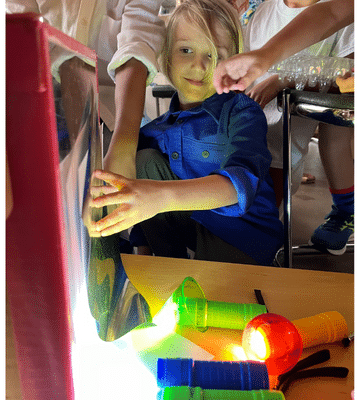Inspired by the Schools of Reggio Emilia

Originating from Northern Italy, the schools of Reggio Emilia engage in a world-renowned approach that focuses on seeing each student with a growth-mindset—as capable and competent. The instructor’s role is to observe and listen to students’ interests, then to provide guidance and opportunities to explore those topics in the classroom.
Projects are not pre-planned by teachers, but driven by student ideas and teacher observations and provocations. With a strong emphasis on collaboration, we nurture our students’ ability to successfully work together with others, a critical skill in today’s world. The environment, and place-based learning, is an essential component of our program, as projects are designed with the intention of using the city and our surroundings as the extended classroom. Learn more about the three "teachers" in the Reggio approach.
The Reggio approach places an emphasis on making learning visible through documentation. When teachers observe their students, they learn each of their learning styles, abilities, and interests. Documentation can take the form of photography, videos, transcribed conversations, drawings, or other visual mediums. Displaying documentation encourages students to become central to their own learning.
We believe learning and joy should go hand in hand from PreK through Grade 12. Our approach doesn't change as our students get older, it simply becomes more complex.
Relationships at the Heart of Learning
When a child enters school for the first time or a new school on that first day, their parent(s)/guardian(s) may be wondering... Will they make friends and meaningful connections? Will they truly be seen? Will they be understood? Will they be happy? Will they like school…will they love school?
We cannot expect students to engage in the learning process if they don't feel seen and heard. Relationships build community. Community creates safety. Students who feel safe and connected are more likely to take productive risks and challenge themselves beyond their perceived limits.
In the words of Professor Carla Rinaldi, “the best environment for children and adolescents is one in which you can find the highest quantity and quality of relationships.”
Preparing Students for the World They'll Inherit
Bennett is a progressive program that prioritizes meaningful activity in learning and participation in classroom democracy. We genuinely believe that students must be invested in what they are learning and the curriculum must be relevant to students’ lives. This is the key to keeping learners engaged.
Learning by doing and the development of life skills are crucial in children’s education. We not only believe this but have built our PreK-12 program to emphasize these life skills.
The World Economic Forum continues to share research predicting the future skills needed for success. Problem-solving, critical thinking, and analysis have always been in the top ten….creativity continues to move further and further up.
Top 10 Skills for 2025
- Analytical Thinking and Innovation
- Active Learning and Learning Strategies
- Complex Problem-Solving
- Critical Thinking and Analysis
- Creativity, Originality, and Initiative
- Leadership and Social Influence
- Technology use, monitoring, and control
- Technology design and programming
- Resilience, stress tolerance, and flexibility
- Reasoning, problem-solving, and ideation
The future critical skills predicted by the World Economic Forum noted that individuals require "reskilling" more than ever – meaning learning new skills to complete new jobs.
As educators, we need to be intentional about providing our students with opportunities to apply their learning in new and novel situations. This is where the beauty of project-based learning (PBL) comes in…it naturally encourages kids to apply their learning to ongoing "real-world" situations, and it helps them retain information longer than traditional methods. Bennett is a progressive program for all of our students, PreK-12.